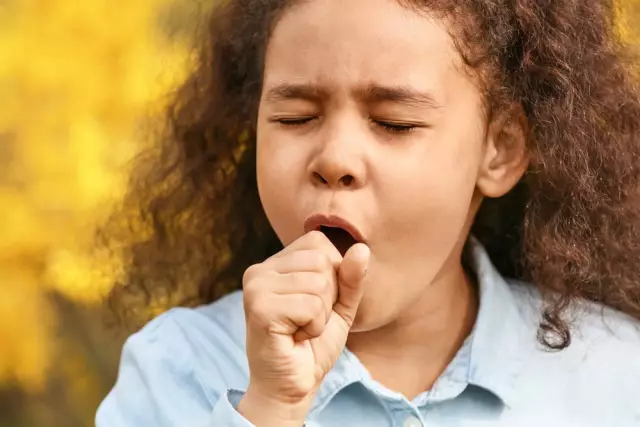- Author Curtis Blomfield blomfield@medicinehelpful.com.
- Public 2023-12-16 20:44.
- Last modified 2025-01-23 17:01.
Respiratory tract infections are considered one of the most common problems. That is why many are interested in questions about what whooping cough is and how it manifests itself. After all, children of preschool age are most susceptible to this disease.
What is whooping cough and what are its causes?

As you know, this disease has an infectious origin. The causative agent of whooping cough, the bacterium Bordatella pertussis, affects the lower respiratory system. It should be noted right away that the only source of pathogenic microorganisms is an infected person, including a latent carrier who does not show symptoms of the disease. The infection is transmitted through the air along with saliva and mucosal secretions.
What is whooping cough and what are its symptoms?

Getting into the respiratory tract, microorganisms attach to the mucous membranes, where they begin to multiply actively. The incubation period usually lasts from 5 to 14 days. After that, the patient has a slight malaise:sick children complain of fatigue and drowsiness, runny nose and mild dry cough. At this stage, the symptoms of whooping cough resemble the common cold. However, it is during this period that the disease is most contagious.
But as the disease progresses, the clinical picture becomes more pronounced. The fact is that bacterial bacilli throw products of their own vital activity into the lumen of the bronchial tract - for the human body, these substances are toxic and can provoke an allergic reaction. The main symptom of whooping cough is a paroxysmal dry cough, during which the child simply cannot breathe normally. In some cases, you can notice how the skin on the face becomes cyanotic, and veins swell in the neck. Quite often, coughing ends with vomiting. Attacks tend to recur 5 to 50 times a day, with the most severe occurring at night.
Interestingly, coughing can cause dust to enter the respiratory tract, fear or nervous strain.
How to treat whooping cough?

Noticing a strong choking cough in a child, you should immediately call a pediatrician. Only a specialist knows exactly what whooping cough is and can correctly diagnose the disease. Most often, treatment occurs at home, while hospitalization is required only in the most severe cases.
Therapy directly depends on the condition of the child and the stage of development of the disease. For example, in the early stages it is advisable to use antibiotics, which can quickly clearorganism from pathogenic microbes.
But if the patient is already suffering from bouts of severe coughing, such antibacterial agents are unlikely to help. In such cases, as a rule, antihistamines are prescribed (for example, tavegil, diphenhydramine), which relieve bronchospasm and make breathing easier. Sometimes it is advisable to take calcium gluconate, as this substance also has anti-allergic properties. In extreme heat, patients are advised to take antipyretic and anti-inflammatory drugs.
In no case should you try to self-medicate or completely ignore whooping cough - the consequences can be extremely serious, especially for the child's body. Yes, sometimes a spasmodic cough goes away on its own, but the attacks return with a decrease in immune defenses or colds. In addition, whooping cough can cause pneumonia. That is why it is important to follow all the doctor's recommendations.
As for prevention, young children are vaccinated against whooping cough, which are very effective. Statistics confirm that only 20% of children after vaccination still developed this disease, but in a milder form.






